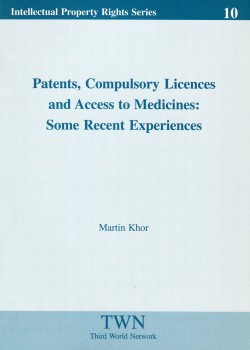
Patents Compulsory Licences andAccess to Medicines
Some Recent Experiences
Author : Khor M.
Publisher: Third World Network
Place of Publish: Malaysia Penang
Year: 2007
Page Numbers: 21
Series: Intellectual Property Rights Series 10
Acc. No: 4622
Class No: 610 KHO
Category: Books & Reports
Subjects: Health
Type of Resource: Monograph
Languages: English
ISBN: 978-983-2729-19-8
Access to medicines has emerged as a major public health issue, especially with the impact of patents on the prices of drugs. High prices of patent-protected medicines have become a major public health concern in developing countries, especially since the coming into force of the World Trade Organization (WTO),s TRIPS Agreement, which sets stringent patent norms for WTO member states. Nevertheless, despite providing for the patenting of medicines, the TRIPS Agreement does allow certain exceptions and flexibilities which are in line with the public interest. This paper examines the TRIPS permitted flexibilities which developing countries can make use of to override drug patents and make available more affordable medicines. Recent examples (from Malaysia, Indonesia, Thailand, Zimbabwe and Ghana) are provided of individual developing countries, use of compulsory licences or government-use orders or other flexibilities to produce and import cheaper generic versions of patented drugs. The author also cautions, however, that a new wave of bilateral “free trade agreements” (FTAs) between developed and developing countries effectively erode these flexibilities by imposing even stricter patent standards than those in the TRIPS Agreement. If left unchecked, the trend towards such “TRIPS-plus” FTAs threatens to undermine access to essential medicines by poor patients throughout the developing world.



